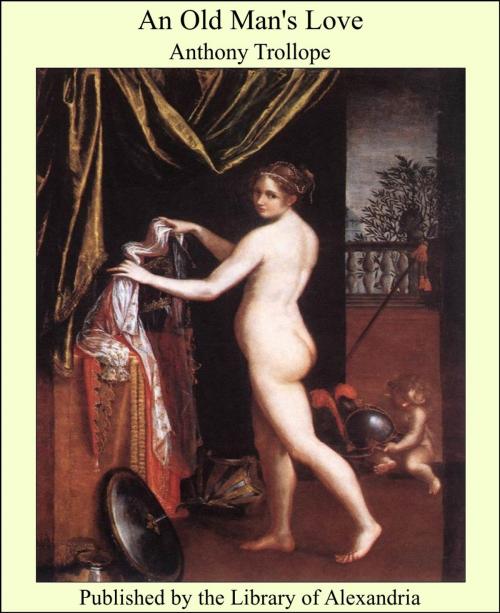| Author: | Anthony Trollope | ISBN: | 9781613103739 |
| Publisher: | Library of Alexandria | Publication: | March 8, 2015 |
| Imprint: | Language: | English |
| Author: | Anthony Trollope |
| ISBN: | 9781613103739 |
| Publisher: | Library of Alexandria |
| Publication: | March 8, 2015 |
| Imprint: | |
| Language: | English |
MRS BAGGETT. Mr William Whittlestaff was strolling very slowly up and down the long walk at his country seat in Hampshire, thinking of the contents of a letter which he held crushed up within his trousers' pocket. He always breakfasted exactly at nine, and the letters were supposed to be brought to him at a quarter past. The postman was really due at his hall-door at a quarter before nine; but though he had lived in the same house for above fifteen years, and though he was a man very anxious to get his letters, he had never yet learned the truth about them. He was satisfied in his ignorance with 9.15 a.m., but on this occasion the post-boy, as usual, was ten minutes after that time. Mr Whittlestaff had got through his second cup of tea, and was stranded in his chair, having nothing to do, with the empty cup and plates before him for the space of two minutes; and, consequently, when he had sent some terrible message out to the post-boy, and then had read the one epistle which had arrived on this morning, he thus liberated his mind: "I'll be whipped if I will have anything to do with her." But this must not be taken as indicating the actual state of his mind; but simply the condition of anger to which he had been reduced by the post-boy. If any one were to explain to him afterwards that he had so expressed himself on a subject of such importance, he would have declared of himself that he certainly deserved to be whipped himself. In order that he might in truth make up his mind on the subject, he went out with his hat and stick into the long walk, and there thought out the matter to its conclusion. The letter which he held in his pocket ran as follows:— St. Tawell's, Norwich, February 18—. MY DEAR MR WHITTLESTAFF,—Poor Mrs Lawrie has gone at last. She died this morning at seven o'clock, and poor Mary is altogether alone in the world. I have asked her to come in among us for a few days at any rate, till the funeral shall be over. But she has refused, knowing, I suppose, how crowded and how small our house is. What is she to do? You know all the circumstances much better than I do. She says herself that she had always been intended for a governess, and that she will, of course, follow out the intention which had been fixed on between her and her father before his death. But it is a most weary prospect, especially for one who has received no direct education for the purpose. She has devoted herself for the last twelve months to Mrs Lawrie, as though she had been her mOther. You did not like Mrs Lawrie, nor did I; nor, indeed, did poor Mary love her very dearly. But she, at any rate, did her duty by her step-mOther. I know that in regard to actual money you will be generous enough; but do turn the matter over in your mind, and endeavour to think of some future for the poor girl.—Yours very faithfully, Emma King. It was in answer to such a letter as this, that Mr Whittlestaff had declared that "He'd be whipped if he'd have anything to do with her." But that expression, which must not in truth be accepted as meaning anything, must not be supposed to have had even that dim shadow of a meaning which the words may be supposed to bear. He had during the last three months been asking himself the question as to what should be Mary Lawrie's fate in life when her step-mOther should have gone, and had never quite solved the question whether he could or would not bring into his own house, almost as a daughter, a young woman who was in no way related to him. He had always begun these exercises of thought, by telling himself that the world was a censorious old fool, and that he might do just as he pleased as to making any girl his daughter. But then, before dinner he had generally come to the conclusion that Mrs Baggett would not approve. Mrs Baggett was his housekeeper, and was to him certainly a person of importance. He had not even suggested the idea to Mrs Baggett, and was sure that Mrs Baggett would not approve. As to sending Mary Lawrie out into the world as a governess;—that plan he was quite sure would not answer
MRS BAGGETT. Mr William Whittlestaff was strolling very slowly up and down the long walk at his country seat in Hampshire, thinking of the contents of a letter which he held crushed up within his trousers' pocket. He always breakfasted exactly at nine, and the letters were supposed to be brought to him at a quarter past. The postman was really due at his hall-door at a quarter before nine; but though he had lived in the same house for above fifteen years, and though he was a man very anxious to get his letters, he had never yet learned the truth about them. He was satisfied in his ignorance with 9.15 a.m., but on this occasion the post-boy, as usual, was ten minutes after that time. Mr Whittlestaff had got through his second cup of tea, and was stranded in his chair, having nothing to do, with the empty cup and plates before him for the space of two minutes; and, consequently, when he had sent some terrible message out to the post-boy, and then had read the one epistle which had arrived on this morning, he thus liberated his mind: "I'll be whipped if I will have anything to do with her." But this must not be taken as indicating the actual state of his mind; but simply the condition of anger to which he had been reduced by the post-boy. If any one were to explain to him afterwards that he had so expressed himself on a subject of such importance, he would have declared of himself that he certainly deserved to be whipped himself. In order that he might in truth make up his mind on the subject, he went out with his hat and stick into the long walk, and there thought out the matter to its conclusion. The letter which he held in his pocket ran as follows:— St. Tawell's, Norwich, February 18—. MY DEAR MR WHITTLESTAFF,—Poor Mrs Lawrie has gone at last. She died this morning at seven o'clock, and poor Mary is altogether alone in the world. I have asked her to come in among us for a few days at any rate, till the funeral shall be over. But she has refused, knowing, I suppose, how crowded and how small our house is. What is she to do? You know all the circumstances much better than I do. She says herself that she had always been intended for a governess, and that she will, of course, follow out the intention which had been fixed on between her and her father before his death. But it is a most weary prospect, especially for one who has received no direct education for the purpose. She has devoted herself for the last twelve months to Mrs Lawrie, as though she had been her mOther. You did not like Mrs Lawrie, nor did I; nor, indeed, did poor Mary love her very dearly. But she, at any rate, did her duty by her step-mOther. I know that in regard to actual money you will be generous enough; but do turn the matter over in your mind, and endeavour to think of some future for the poor girl.—Yours very faithfully, Emma King. It was in answer to such a letter as this, that Mr Whittlestaff had declared that "He'd be whipped if he'd have anything to do with her." But that expression, which must not in truth be accepted as meaning anything, must not be supposed to have had even that dim shadow of a meaning which the words may be supposed to bear. He had during the last three months been asking himself the question as to what should be Mary Lawrie's fate in life when her step-mOther should have gone, and had never quite solved the question whether he could or would not bring into his own house, almost as a daughter, a young woman who was in no way related to him. He had always begun these exercises of thought, by telling himself that the world was a censorious old fool, and that he might do just as he pleased as to making any girl his daughter. But then, before dinner he had generally come to the conclusion that Mrs Baggett would not approve. Mrs Baggett was his housekeeper, and was to him certainly a person of importance. He had not even suggested the idea to Mrs Baggett, and was sure that Mrs Baggett would not approve. As to sending Mary Lawrie out into the world as a governess;—that plan he was quite sure would not answer















